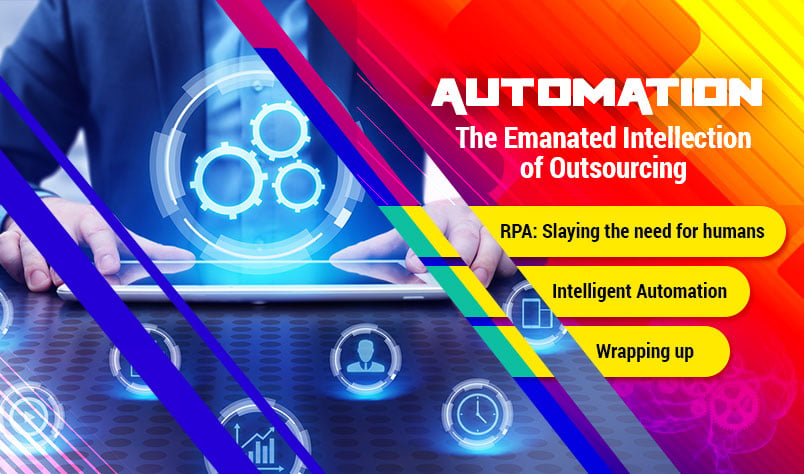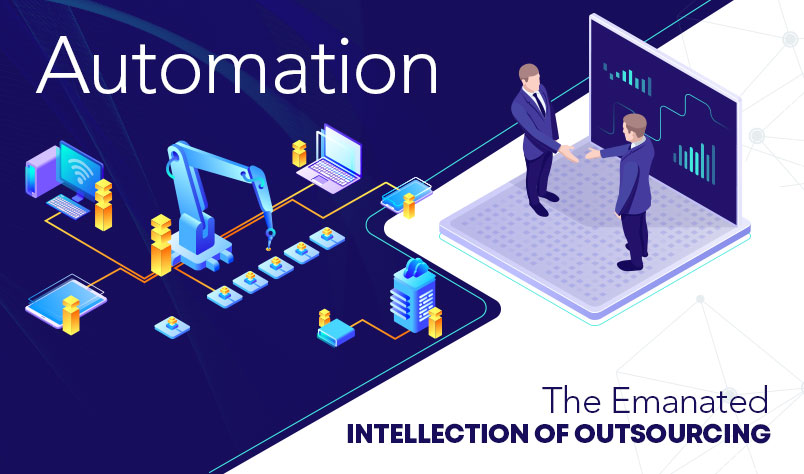-
Get Cloud GPU Server - Register Now!
Toggle navigation

“The last decade was about replacing labor with cheaper labor. The coming decade will be about replacing cheaper labor with autonomics.”
— Chetan Dube, Founder, IPsoft Inc.
The progression of technological advancements in the business industry and our daily lives has matured human life to an astute but rational phase. With perpetual amelioration of tech, the customer preferences and expectations have been hopping like a bunny.
The outsourcing sector, that has been the stronghold for a number of business industries, also has to face the wrath of the vacillating business climate. For a number of decades, the outsourcing sector enjoyed the swift rise and complete dominance on the business community, owing to marvelous benefits such as cost-effectiveness, elevated efficiency, access to a diligent team, and a hiked ROI.
However, with technology like RPA (robotic process automation) now showing its worth in almost all aspects of life, there has been discomfort and agitation in the stakeholders of the outsourcing sector. With robots now stepping up to jobs like waiters, bookkeepers, receptionists, front-door executives, data-entry experts, scavengers, etc., the possibility of eliminating human intervention from jobs that require less intelligence and are more routine seems real.
Now, with the phrase ‘eliminating human intervention’ comes the thought of robots replacing humans, and suddenly there is chaos, fear, and insecurities. However, if you are really a business expert who understands how technology plays its part in any revolution, you will not be scared.
In fact, you will be surprised to know that unlike other business sectors, outsourcing service providers are more keenly implementing RPA technology into their operating models.
Life is not a Hollywood flick, where robots act ultra-intelligently and the survival of humans is at stake. The only questionable thing with RPA is how it can be implemented in large enterprises and vast business ecosystems smoothly.
However, with time, RPA will be soon converted into essentiality. Hundreds of companies have already started implementing RPA into their business models, making the processes much streamlined, frictionless, and prompt.
Not just businesses but our mundane tasks like taking pizza orders, checking luggage in or out, making hotel bookings, fixing doctor’s appointment, and many more are handled by robots only. With RPA now claiming the territory of customer service sector too, the rundown will soon be reshaping the outsourcing industry.
Did you know: Industry experts have predicted that by 2020, 85% of all customer interactions will be managed without any human interposition?
So, the inclusion of RPA will be a necessity for all businesses.
What do customers think?
Who doesn’t want quick assistance? As a customer, I don’t care who is covering my pain point, the only things that matter are quality and pace of service delivery. Since RPA is known to easily perform repetitive human tasks, the delivery of service is done faster, without letting the quality down.
Cut to the bone, customer preferences will be transformed into the need of a vendor who is highly efficient and prompt in service delivery, making the deployment of RPA more quintessential.
What’re market experts’ thoughts?
Now, the outsourcing sector that runs on the concept of delivering ace-level service experience has been dependent on its colossal workforce. There is a pertaining assumption that RPA entering into the spectrum of Business Process Outsourcing ( BPO ) will result in humungous job loss for human agents.
Albeit the fear is quite obvious, RPA is nothing but enhancing the overall operational capability of the outsourcing industry. If a particular task is automated by a BPO, the service delivery will be prompt and of the first-string level. Isn’t this is what every business outsourcing company wishes to achieve?

Also, the need of humans in the automated processes will definitely decline but anyways agents don’t like the tedious and repetitive jobs of handling calls, taking orders or replying to the same queries on a streak.
If you would look at the bigger picture, RPA is revolutionizing the BPS sector. Organizations can now allocate their workforce to work on the tasks that require a higher level of intelligence, while efficient robots are handling the extraneous business functions, leading to comprehensively raised productivity.
Deloitte Consulting and KPMG Group have observed that the cost saved with RPA included in BPS is 70% more than what is done with the conventional outsourcing model.
You will be glad to hear that this is not the only benefit. There are a number of advantages that RPA offers to the business sector. However, there is one thing to consider. Handling and maintaining RPA technology requires deep domain knowledge.
Outsourcing companies that have already adapted to RPA norms will be a much obvious choice for the business owners rather than doing it in-house.
So, what are the tasks that businesses should outsource to the RPA-powered BPOs? Any business task that is rule-based and is readily apparent should be outsourced.
The benefit of RPA with BPS includes the complete elimination of issues such as scalability. Robots are highly efficient and effective in managing multiple or suddenly occurring requirements, giving organizations an upper edge in the competition.
When dealing with agents, you have to train your new agents again and again. With RPA, the instructions need to be given only once and the bot will be proficiently repeating the task in the correct sequence, with precision, and without any break.
Of course, high precision with RPA will raise the credibility of BPOs and contact centers.
Like every other business revolution such as industrial and computer, the wave of AI also forms a hazy picture at its beginning.
This means that BPOs or organizations that are incorporating RPA into their business models need to wait a bit to get the expected ROI. If implementing RPA internally, companies may need to invest more time and money, defeating the very purpose of having an efficient technology.
So, contacting your outsourcing service provider for RPA assistance would bring much to the business owners’ plate than an in-house facility. Global outsourcing companies are deploying automation at a rapid pace. This new tech has increased the scope of solutions that the BPOs used to provide to the organizations.
RPA is transforming human activity into software using AI. And as we all know, a software that is installed in the correct manner never deviates from its objective. Still, there a myriad of outsourcing firms that are yet to utilize RPA, why?
Because there is a glitch.
The outsourcing contracts and pricing structure in the last few years have been designed so that they don’t include the swift deployment of RPA standards. So, it presents a technical roadblock.
However, the organizations, both outsourcing and outsourced should be prepared well enough to use this profound technology to its fullest.
To begin with IA, a business owner should keep a close eye on the processes that are consuming a large workforce.
You should only automate the functions that are voluminous in terms of both operation and workforce. What’s astonishing is that this was the same criteria that was used to outsource the business tasks three decades ago when conventional BPO emerged.
RPA and AI are mainly utilized to simplify the complexity level of organizations to increase their performance.
However, to comprehend how IA and enterprises will react to each other depends on the kind of business integration in the company. For instance, if a big organization operates hundreds of ERPs that when centralized consist of 50+ systems, it will be difficult to be integrated with RPA on a holistic level due to the presence of high sophistication. These companies, if outsourcing their functions to a BPS provider who is using RPA, will find it tough to get expected ROI.
On the other hand, another big company has already concentrated its systems and smoothened processes with one ERP system and a centralized collection of records that can save a tremendous sum of money by tying up with a modern BPS vendor.
RPA is the rising trend of the outsourcing sector and in the coming years will integrate impeccably with the BPOs and contact centres. Already you can see chatbots challenging the live chat agents in terms of efficiency and accuracy. With businesses becoming more complex and BPS evolving rapidly with ultra-modern techs like Cloud, AI, and RPA, the coming years will be novel for the outsourcing industry.
The saga of businesses and customers will be made further serene and outsourcing will continue to offer organizations an extraordinary opportunity to lower the expense and increase their operational output, with RPA and AI at its either side.
We would love to hear your thoughts on RPA and BPS. Tell us your observations and anticipations in the comments section. Thanks!